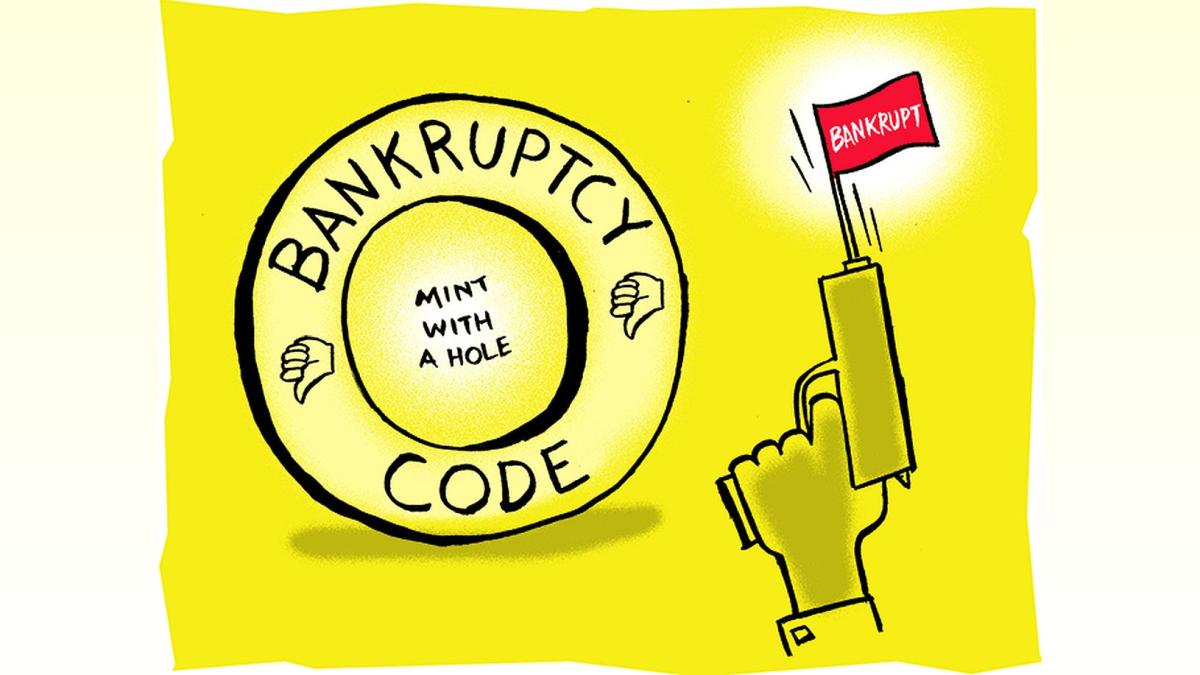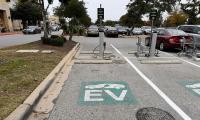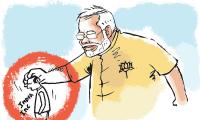NCLT Needs More Manpower Amid IBC Case Delays
The National Company Law Tribunal (NCLT) President calls for more manpower to address delays in insolvency cases under the IBC, emphasizing the need for a second generation of reforms.

Illustration: Dominic Xavier/Rediff.com
New Delhi, Oct 1 (PTI) Amid concerns in certain quarters about long delays in admission of cases under the insolvency law, NCLT President Chief Justice (Retd) Ramalingam Sudhakar on Tuesday stressed on the need for more manpower even as he said despite the limitations, it will show success.
The National Company Law Tribunal (NCLT) is a key institution in implementing the Insolvency and Bankruptcy Code (IBC).
According to Sudhakar, banks and other financial institutions file petitions containing 20-30 volumes of documents, and there are also innumerable agreements.
"... the interpretation of these documents is a legal argument... please don't imagine that NCLT can do some magic by saying admit debt and default... we can't," he said in the context of delays in admitting cases under the IBC.
Speaking at a function to mark the eighth foundation day of the Insolvency and Bankruptcy Board of India (IBBI) in the national capital, Sudhakar said whatever the limitations, "we will show you success".
"If you put a new law in force, isn't it not required for the ministry to put new members, new judges?... I have been asking again and again, not only to the ministry but also to Parliament, they should give more numbers. No offence, I am telling you a simple thing, give me the numbers, I will give you the result," Sudhakar said.
India's G20 Sherpa and former Niti Aayog CEO Amitabh Kant said it must be acknowledged that there are some concernsabout the present functioning of the IBC, indicating a need for a second generation of reforms.
"An analysis of IBBI's own data shows insolvency resolution at the NCLT averaged 716 days in the last fiscal year, up from 654 days in 2022-23. More concerning is the average time taken for admission of cases, which stood at 468 days in financial year 2021 and increased to 650 days in 2022.
"I understand an amendment to the Code is under consideration wherein the record of defaults issued by an information utility would be sufficient to substantiate defaults without any further deliberations. This will expedite admission process and bring it in line with the time prescribed in the Code," Kant said.
He also called for a model law on cross-border insolvency.
The progress made over the past eight years with respect to the IBC is commendable and in the next phase of the journey, "continuous dialogue, collaboration, and innovation will be essential to strengthening our insolvency framework," he emphasised.
Chief Economic Advisor V Anantha Nageswaran said a good bankruptcy regime is a backstop during down swings, reducing the need for costly macro prudential interventions.
"A continuously evolving and improving IBC framework is important for India to achieve 7-8 per cent growth rate over the next decade," he said.
Further, Nageswaran said an orderly resolution framework will deter the volatility of India's credit cycles.
"In India, IBC acts as a systemic benefit creator through multiple channels. The immediate impact of IBC has been to resolve the twin balance sheet problem of banks and corporates in the second decade of this millennium," he noted.
While noting that an effective bankruptcy resolution is critical for bond investors to develop confidence in the Indian market, he said currently, the bond market is skewed to the highly rated bonds which account for more than 85 per cent of all issuances.
"To develop a deep and liquid market for the low rated bonds, investor confidence in effective bankruptcy resolution will be crucial. We believe the current IBC regime will therefore facilitate the development of the bond market in India with much wider spread of credit ratings in the years to come," Nageswaran said.
Lenders have recovered Rs 3.5 lakh crore through resolution of stressed assets under the IBC in the last eight years, IBBI Chairperson Ravi Mital said.
The National Company Law Tribunal (NCLT) is a key institution in implementing the Insolvency and Bankruptcy Code (IBC).
According to Sudhakar, banks and other financial institutions file petitions containing 20-30 volumes of documents, and there are also innumerable agreements.
"... the interpretation of these documents is a legal argument... please don't imagine that NCLT can do some magic by saying admit debt and default... we can't," he said in the context of delays in admitting cases under the IBC.
Speaking at a function to mark the eighth foundation day of the Insolvency and Bankruptcy Board of India (IBBI) in the national capital, Sudhakar said whatever the limitations, "we will show you success".
"If you put a new law in force, isn't it not required for the ministry to put new members, new judges?... I have been asking again and again, not only to the ministry but also to Parliament, they should give more numbers. No offence, I am telling you a simple thing, give me the numbers, I will give you the result," Sudhakar said.
India's G20 Sherpa and former Niti Aayog CEO Amitabh Kant said it must be acknowledged that there are some concernsabout the present functioning of the IBC, indicating a need for a second generation of reforms.
"An analysis of IBBI's own data shows insolvency resolution at the NCLT averaged 716 days in the last fiscal year, up from 654 days in 2022-23. More concerning is the average time taken for admission of cases, which stood at 468 days in financial year 2021 and increased to 650 days in 2022.
"I understand an amendment to the Code is under consideration wherein the record of defaults issued by an information utility would be sufficient to substantiate defaults without any further deliberations. This will expedite admission process and bring it in line with the time prescribed in the Code," Kant said.
He also called for a model law on cross-border insolvency.
The progress made over the past eight years with respect to the IBC is commendable and in the next phase of the journey, "continuous dialogue, collaboration, and innovation will be essential to strengthening our insolvency framework," he emphasised.
Chief Economic Advisor V Anantha Nageswaran said a good bankruptcy regime is a backstop during down swings, reducing the need for costly macro prudential interventions.
"A continuously evolving and improving IBC framework is important for India to achieve 7-8 per cent growth rate over the next decade," he said.
Further, Nageswaran said an orderly resolution framework will deter the volatility of India's credit cycles.
"In India, IBC acts as a systemic benefit creator through multiple channels. The immediate impact of IBC has been to resolve the twin balance sheet problem of banks and corporates in the second decade of this millennium," he noted.
While noting that an effective bankruptcy resolution is critical for bond investors to develop confidence in the Indian market, he said currently, the bond market is skewed to the highly rated bonds which account for more than 85 per cent of all issuances.
"To develop a deep and liquid market for the low rated bonds, investor confidence in effective bankruptcy resolution will be crucial. We believe the current IBC regime will therefore facilitate the development of the bond market in India with much wider spread of credit ratings in the years to come," Nageswaran said.
Lenders have recovered Rs 3.5 lakh crore through resolution of stressed assets under the IBC in the last eight years, IBBI Chairperson Ravi Mital said.
You May Like To Read
TODAY'S MOST TRADED COMPANIES
- Company Name
- Price
- Volume
- Vodafone-Idea-L
- 11.66 (+ 0.09)
- 43529038
- Spright-Agro
- 0.77 ( -4.94)
- 16451517
- Harshil-Agrotech
- 0.60 ( -1.64)
- 15849277
- Mehai-Technology
- 1.65 ( -4.62)
- 10042675
- AvanceTechnologies
- 1.06 ( -4.50)
- 7968584





